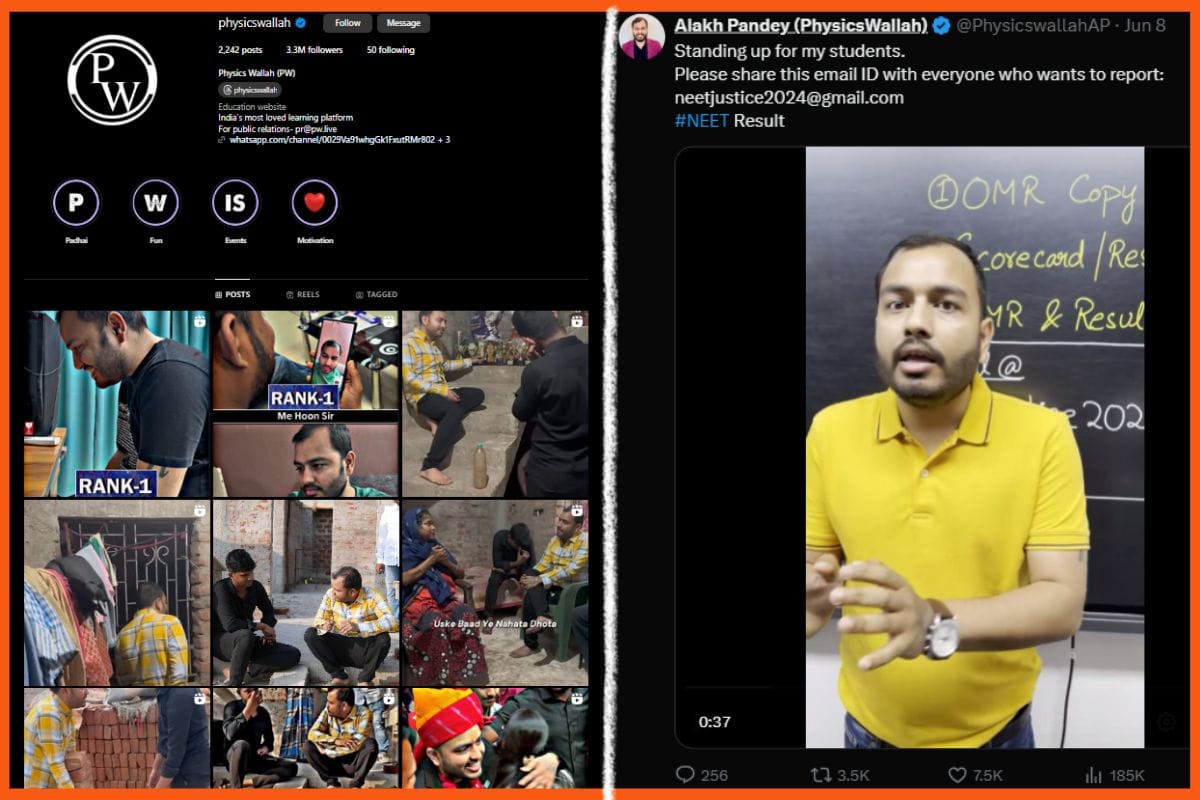India’s edtech industry is valued at $7.5 billion in 2024, and is projected to grow to $29 billion by 2030. One name stands out: Physics Wallah, an Indian unicorn edtech startup founded in 2016 by Alakh Pandey and Prateek Maheshwari. Today, the brand is a household name among students preparing for competitive exams.
So, how has Physics Wallah stood out in an industry crowded with big players? Its USP: offering affordable, high-quality learning resources, particularly in STEM subjects.
But here’s the kicker — Physics Wallah’s marketing strategy is as clever as their teaching methods. Mixing grassroots efforts with savvy social media moves and the founder’s star power, the startup has shaken up traditional education and amassed millions of subscribers across various platforms.
Curious how they’ve pulled this off? What’s behind Physics Wallah‘s meteoric rise? Let’s find out.
Physics Wallah – Target Audience
Physics Wallah – Marketing Mix
Physics Wallah Marketing Strategy
Unique Features of Physics Wallah’s Marketing Strategies
Physics Wallah’s – Marketing Campaigns
What’s Driving Physics Wallah’s Marketing Success?
Physics Wallah – Target Audience

Physics Wallah primarily targets Indian students aged 14-22, preparing for competitive exams like JEE, NEET, and other engineering and medical entrance tests.
The edtech startup caters to students from diverse socioeconomic backgrounds; both urban and rural learners looking for high-quality education without breaking the bank. Often, Physics Wallah reaches students in tier 2 and tier 3 cities with limited access to quality coaching.
The target audience is tech-savvy go-getters who can’t always make it to fancy coaching centers. They are motivated to excel academically and are looking for flexible, online learning options to supplement their school education.
Physics Wallah – Marketing Mix

Physics Wallah’s marketing strategy is centered around a single premise: offering high-quality, affordable education to everyone. Here’s what the company’s marketing mix looks like.

- Product: What is Physics Wallah selling? Primarily online educational content in the form of video lectures, study materials, and live classes, that focus on physics and other subjects for competitive exams.
- Price: Physics Wallah is way cheaper than your typical coaching centers, which means more students can afford to learn. For instance, the fee structure for Physics Wallah’s Vidyapeeth JEE Fastrack 2024 is INR 35,400, whereas a one-year course at a reputable institute can easily set you back between INR 1,00,000 and INR 3,00,000.
- Place: It’s primarily online – website, app, and YouTube channel. You can study from your bedroom if you want to! However, the startup also has offline Vidyapeeth centers.
- Promotion: When it comes to getting the word out, Physics Wallah is all over social media and YouTube. But, their best advertisers are their own students. Happy kids tell their friends, and boom – more students. Let’s not forget Alakh Pandey, the founder. He’s the face of the brand, and people really connect with him.

Physics Wallah Marketing Strategy
Physics Wallah uses a multi-pronged marketing approach to reach and engage its target audience of students preparing for competitive exams. Its marketing strategy leverages both digital and traditional channels to maximize reach and impact.
A strong online presence and content-driven approach is its biggest strength. The platform’s YouTube channel, which boasts over 13 million subscribers to date, is a significant source of organic traffic and brand awareness. Essentially, the company uses the “give a little, get a lot” approach. By putting out free educational content, they’re not just being generous – they’re playing the long game.
Think of it like this: the company gives students a taste of what it offers through free videos or materials. This accomplishes two things at once. First, it shows students that Physics Wallah really knows their stuff. It builds trust and credibility. Second, it gives students a chance to experience the value of what Physics Wallah provides.
So, when these same students are considering paid tutoring or courses, who do you think comes to mind first? Physics Wallah, of course! Let’s look at each of their marketing strategies in a little more detail.
SEO Strategy
Physics Wallah’s robust SEO strategy helps improve its visibility in search engine results. The website and content is optimized for relevant keywords. Think exam-specific keywords like “JEE Main preparation”, “NEET study materials”, or “UPSC coaching online” or subject-specific terms such as “organic chemistry formulas” and “Newton’s laws of motion explained”.
Mock tests like the NEET mock test and JEE Main mock test keep students engaged, help increase time spent on their website, and reduce bounce rates. The regular addition of new tests keeps the content fresh – all important markers for SEO success.
The startup also collaborates with educational blogs like Ed Tech Review for guest posting opportunities and encourages student testimonials and link backs from their personal blogs or social media
On the YouTube channel, Physics Wallah makes sure to optimize video titles, descriptions, and tags for search and creates playlists for specific subjects and exam preparation strategies.
OTT Advertising
By expanding to OTT platforms like Amazon Mini TV, Physics Wallah differentiated itself from competitors who were focused solely on dedicated educational apps or websites. The platform strategy also aligned with where the target audience was spending a significant amount of time.
Social Media Strategy

Physics Wallah uses social channels like Instagram and Twitter to share educational content, exam tips, motivational messages, and updates about their courses and offerings.
On social media, Physics Wallah has unapologetically jumped on the meme bandwagon, creating and sharing funny educational memes related to the subjects they teach. Why does this work? Their target audience is students. And, every time a student chuckles at one of their memes, they’re also remembering the brand.
Community Building
The platform builds a strong learning community through doubt-solving groups, interactive live sessions, and active social media engagement. This sense of belonging keeps students loyal and engaged. It also encourages peer-to-peer learning, where students support each other and share knowledge. Regular motivational sessions further strengthen this bond, making students feel connected to the brand.
Paid Advertising Campaigns
To complement its organic reach, Physics Wallah invests in targeted paid advertising campaigns across search engines and social media platforms. These campaigns are designed to reach potential students searching for educational resources or who are interested in preparing for competitive exams.
Email Marketing
Email is one of the most cost-effective mediums to nurture leads and maintain engagement. Physics Wallah sends students newsletters with study tips, exam updates, and promotional offers to keep them informed.
Emails can be personalized based on student data, so Physics Wallah can tailor content to specific segments of their audience. JEE aspirants and NEET-focused students receive a different set of emails from occasional users at risk of dropping out. Moreover, these emails can be tailored to different stages of the student journey, from initial interest to active learning and beyond.

Unique Features of Physics Wallah’s Marketing Strategies
Physics Wallah’s distinctive marketing strategies are behind the company’s rapid growth and popularity. Let’s take a closer look.
- Founder-centric branding: The company heavily leverages the persona of Alakh Pandey, who prominently features on marketing materials and content. His rags-to-riches story resonates with many students and creates an emotional connection.
- Affordable pricing: Physics Wallah emphasizes its low-cost, high-quality education model. The brand positions itself as an accessible alternative to more expensive competitors.
- Vernacular approach: The platform offers content in multiple Indian languages, to appeal to a broader audience beyond English-speaking urban centers.
- Word-of-mouth marketing: The company encourages student testimonials and success stories. This boosts organic growth through peer recommendations.
- Offline-online integration: Physics Wallah has expanded into physical coaching centers, creating a hybrid model that appeals to students who prefer traditional learning environments.
Physics Wallah’s – Marketing Campaigns
Let’s take a look at some of Physics Wallah’s major marketing campaigns that have helped the brand’s growth.
PW Pathshala
One of their most successful campaigns, PW Pathshala aimed to provide free offline classes in various cities. It gave students the opportunity to experience Physics Wallah’s teaching methodology firsthand. The campaign generated significant buzz and helped convert many attendees into long-term users of their online platform.
PW Scholarship Test
The PW Scholarship Test offered substantial discounts on courses to high-performing students. This not only attracted talented learners but also created a sense of aspiration among the student community, positioning Physics Wallah as a platform for serious academic pursuit.
Learn from Home
Launched during the COVID-19 pandemic, the Learn from Home campaign emphasized the accessibility and effectiveness of online learning. Physics Wallah offered free live classes and study materials to students affected by school closures. The initiative significantly boosted Physics Wallah’s user base and brand recognition.
Physics Wallah TV Series
Physics Wallah TV Series | physics Wallah Advertisement
In 2022, the TV series Physics Wallah was released on Amazon Mini TV. The series focused on the life of Alakh Pandey and his company. The inspiring story tells us Pandey’s journey from a top student in Class 10 and Class 12 who was unable to crack the IIT exam, to 2016, when armed with nothing but a camera and a passion for teaching, he launched the YouTube channel “Physics Wallah – Alakh Pandey.”
The relatable and motivating story solidified Alakh Pandey’s personal brand which has been one of the key drivers of the Physics Wallah success story.

What’s Driving Physics Wallah’s Marketing Success?
In a nutshell, Physics Wallah has consistently delivered value and maintained a focus on student success.
The company’s affordable pricing strategy and high-quality content resonate with price-sensitive Indian students, while the effective use of social media and word-of-mouth marketing has amplified brand reach.
Physics Wallah’s authenticity, affordability, and quality content continue to drive its marketing success in India’s competitive edutech landscape.
FAQ
Who is CEO of Physics Wallah?
The CEO of Physics Wallah is Alakh Pandey.
Is Physics Wallah free or paid?
At Physics Wallah, students can choose between paid and free batches to suit their preferences and budgets.
Is Physics Wallah good for IIT?
Yes, Physics Wallah is highly regarded for IIT JEE preparation. It offers affordable, high-quality courses, well-structured materials, and experienced instructors, making it a popular choice among IIT aspirants.

























